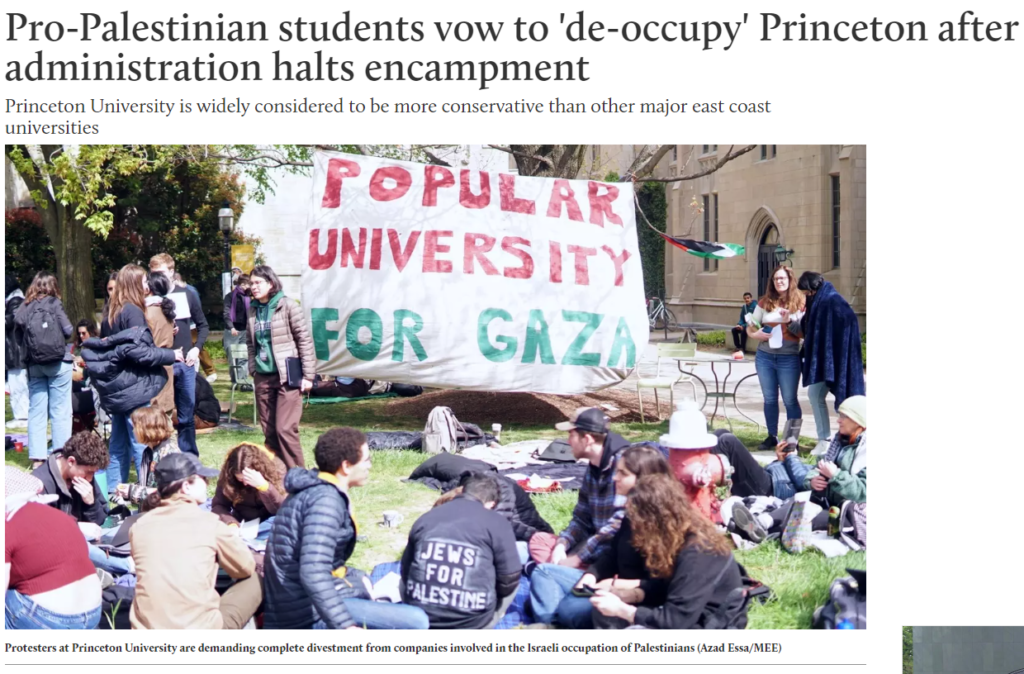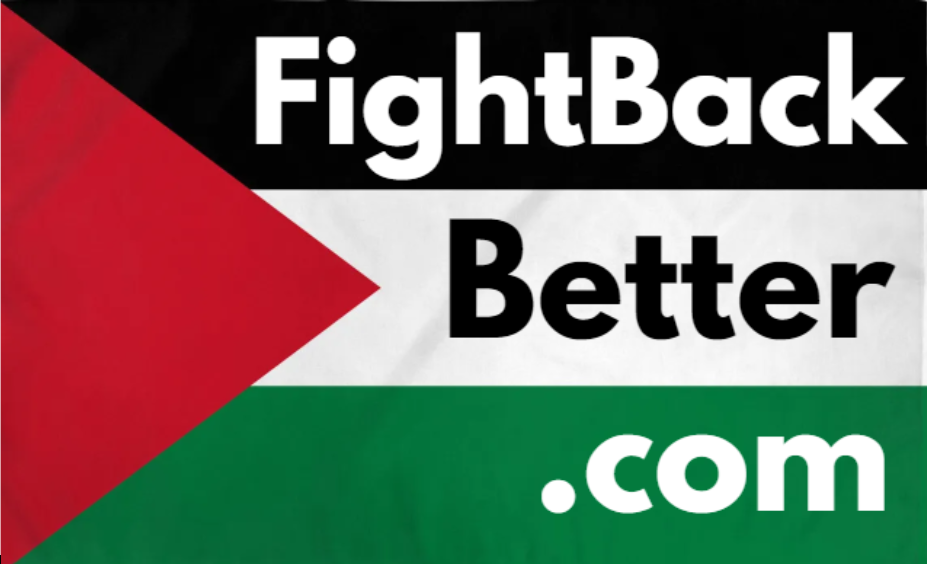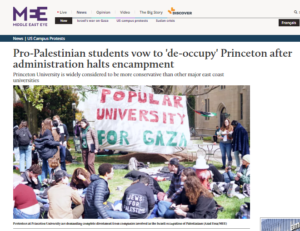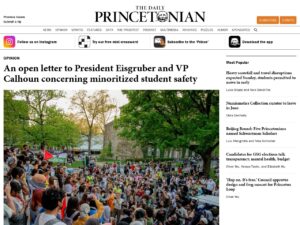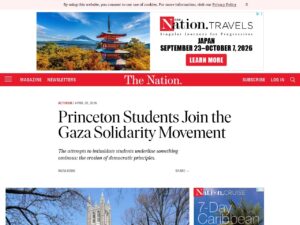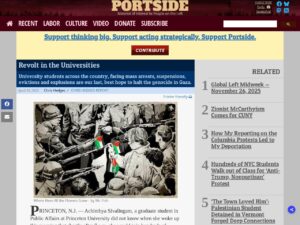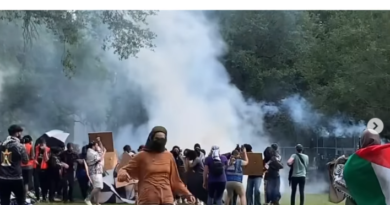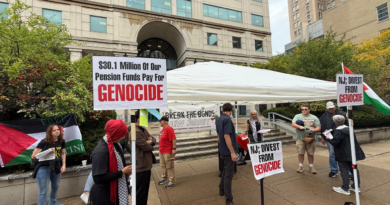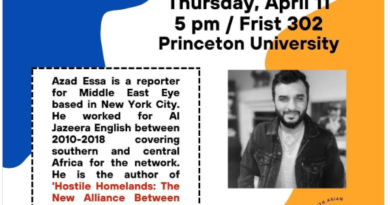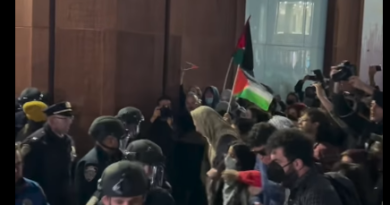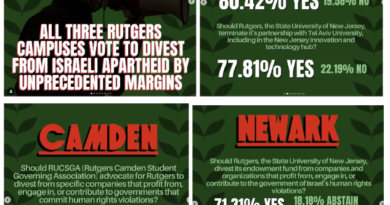Press Release: Princeton Admininistration Stonewalls Student Encampment / Hunger Strike Negotiations
PRINCETON ADMINISTRATION STONEWALLS NEGOTIATIONS WITH SOLIDARITY ENCAMPMENT
Princeton, New Jersey, May 11
Two weeks into the Princeton Gaza Solidarity Encampment and one week into a student-led hunger strike, Princeton administrators have stonewalled negotiations with representatives of the encampment on their demands for divestment. Instead of making tangible commitments, administrators backpedaled on opening negotiations and merely directed representatives to existing institutional processes, which protestors say disregards the urgency of the genocide in Gaza. The encampment’s demands are financial divestment, military divestment, an academic and cultural boycott of Israel, cultivating Palestinian affiliations, ending the silence on genocide in Gaza, and amnesty for encampment participants.
Representatives from the encampment, including undergraduate students, graduate students, postdoctoral scholars, and faculty, first reached out to administrators on April 25 to negotiate on the encampment’s demands. After continued pressure by the encampment and the start of the hunger strike, Eisgruber held a meeting on May 6 with representatives, where he emphasized the importance of campus consensus—which he could not define—and existing processes. He refused to meet again, but directed representatives to a team of administrators. In a meeting on May 8 with encampment representatives, four senior administrators stated that they would be negotiators, agreeing to meet the next day due to the urgency of the hunger strike and to meet again on May 10 to negotiate a formal agreement. They welcomed the precedent set by negotiations with the Black Justice League in 2015, a movement that included direct action and resulted in a signed agreement for institutional change.
However, on Thursday, May 9, the same four administrators backpedaled on their intention to negotiate. In contrast to the prior Wednesday meeting, they argued that institutional policies and practices have changed since the Black Justice League sit-in that prevent the circumvention of existing processes. They also shifted from expressing urgency at resolving the hunger strike to saying that they hoped the hunger strikers would make good personal choices for their health, but that they were not responsible for resolving the hunger strike. The four administrators maintained their refusal to negotiate at a final meeting on May 10, despite reminders of their previous statements. The commitments made at the May 8 meeting, then, were entirely misleading.
“On Wednesday, when I asked the administrators to clarify their role, they said that they would be the negotiators at the table,” said Jessica Ng, a postdoctoral scholar representative. “Then on Thursday, three hours before our next meeting, they wrote to say they wouldn’t be negotiating after all. We can only speculate what happened between now and then, but it was a total turnaround in tone and intention.”
Throughout these meetings, the university has refused to acknowledge the gravity of the genocide in Gaza, with Eisgruber questioning even the characterization of Israel as an apartheid state. Emanuelle Sippy, an undergraduate student representative, pointed out, “Eisgruber has decided that some historical crises warranted a statement, such as October 7 and the beginning of the war in Ukraine. I find it morally bankrupt that the university cannot acknowledge the immense devastation and loss of Palestinian life.”
Despite the administrators’ emphasis on existing processes, Eisgruber has blocked avenues for due process. In advance of an all-university faculty meeting requested by faculty and scheduled for May 20, Eisgruber excluded all proposed motions pertaining to military investments, divestment, and cultivating ties to Palestinian academic institutions, only allowing a single motion regarding student disciplinary action. In a clear instance of using policy and predilection of process to block dialogue at this critical juncture, Eisgruber postponed the faculty’s divestment proposals to the fall. This procedural delay stonewalls the efforts of faculty and the encampment at large.
Students launched the encampment on Thursday, April 25 when protestors pitched tents in the McCosh Courtyard. Two students were immediately arrested, and the tents were taken down under threat of further arrests. Princeton students, affiliates, and community members continued to protest through nonviolent direct action, including a sit-in at Clio Hall that was met with increased police presence and arrests and an undergraduate-led hunger strike that the administration has largely ignored. In the meantime, Princeton’s Popular University for Gaza has persisted through rain and police threats in unflinching solidarity with Palestine.
The administration’s refusal to negotiate is not a loss for the Palestinian liberation movement at Princeton, but a failure of the university to take seriously its purported responsibility to serve humanity. Disingenuous gestures toward negotiations and deliberate tactics of delay demonstrate a staggering lack of moral clarity and a commitment to financial profit over human life. The students and the community at Princeton have played a pivotal role in an unprecedented national movement for Palestine, while Eisgruber and his administration have chosen the wrong side of history. Princeton encampment representatives say they are undeterred.
“We got the administration to engage with the groundswell of support for Palestine,” said Givarra Azhar Abdullah, an undergraduate student representative. “We saw tensions within the institution. They’re paying attention to our protest and they’re worried. The students are steadfast, creative, and energized.”
The encampment cannot disclose its next steps, but the long history of anti-war movements and decolonial struggles has taught students that they must push beyond existing institutional processes. As Israel continues its invasion of Rafah and blocks lifesaving aid from Gaza, the Palestinian liberation movement at Princeton vows to continue to increase pressure on the university and remains committed to its demands.
This shows that no matter how peaceful you are – you do a sleep in – send the SWAT and RIOT COPS! Do a hunger strike – ban the care takers.
The system always tries to tell us to do it within channels. So how does a hunger strike threaten anyone?
It really is not about campus safety but about ending opposition to US support for Israel.
Please connect to the organizers through this tweet and help spread their message and learn how to further support.
Previous Reports:
RUHA BENJAMIN AND PRINCETON FACULTY WITNESSES SPEAK OUT ON CLIO HALL SIT-IN Reprinted from Published Open Letter Link
Dear Members of Princeton University and Mercer County,
In her letter to the Princeton community on April 30 VP Rochelle Calhoun states, “As protestors entered Clio Hall, our staff found themselves surrounded, yelled at, threatened, and ultimately ordered out of the building.” Calhoun also wrote that “The way they [Princeton staff] were treated yesterday was abusive.”
However, VP Calhoun was not present when students entered the building.
As the (primary) faculty observer of the sit-in, I entered the building with students and what I witnessed firsthand is that they entered the office calmly, their collective demeanor so polite that the individual at the front desk asked if they had an appointment and began to look up something on her computer. At this point the students continued into the interior offices and spoke with staff members, telling them of their intentions to hold a peaceful sit-in. My colleague Naomi Murakawa, also a non-participant faculty observer who witnessed the entry and left before students closed the door, also noted that students were polite and soft-spoken.
And the staff, who should also be commended and who appeared to be familiar with the traditions of peaceful student protest, simply took a minute to finish emails and then packed up their bags. They walked out without incident.
In short, what we witnessed inside Clio Hall bears no resemblance to VP Calhoun’s letter.
No one yelled. No one made threats. There were thirteen Princeton-affiliated sit-in participants and one student journalist, and not one treated Princeton staff in an “abusive” fashion.
In fact, no head administrator came into Clio Hall that afternoon or early evening. This is a shame in and of itself because students have repeatedly requested meetings and discussions with Princeton administrators. Without bearing witness, VP Calhoun wrote about the peaceful sit-in in a misleading and even inflammatory way. It does not reflect the reality that we observed. And we fear that her account may be persuasive to anyone who holds the worst stereotypes about protesters, especially protestors who are Black, Arab, Muslim, Palestinian, or otherwise presumed to be dangerous and threatening.
By contrast, the cordial, quiet, and organized behavior we witnessed is consistent with what we suspect might be happening inside students’ minds. Perhaps these students are afraid of police and criminalization and banishment from the university—and quite reasonably so, as we faculty also fear these things—but deeply held principle kept them moving through their fear. We wish that a single administrator had come inside Clio Hall to see this.
Police escorted Princeton staff out the back door of Clio Hall. Protesters opened up a corridor for staff to pass with the three or four PSAFE officers. It is possible that accusations of “abusive” behavior reference that fact that protesters often chant/shout the word “Shame” at the increasingly frequent sight of police patrols.
After PSAFE arrived and closed off access to the offices, three faculty observers stayed in the foyer, which remained unlocked and accessible to all. They knocked on the locked door repeatedly and asked for a representative from PSAFE to talk to them. They asked permission to come inside as faculty observers and expressed concern for the wellbeing of our students. PSAFE did not allow their entry, but the head did speak with them several times and gave his reassurances. There was no yelling. The three professors left the building when asked to by security. Three professors asking about student well-being does not constitute “abusive” behavior to PSAFE.
But we ought to step back for a moment and understand how VP Calhoun’s letter misrepresents the core issue: it claims that peaceful protestors could constitute a threat, especially toward armed law enforcement. The students who took action deliberately did so in a proud tradition of nonviolent resistance. It was they who were threatened and, worse, made to suffer the realization of those threats when their justified and decent demand for a meeting with administrators was met with handcuffs. The letter’s misrepresentation of events amounts to a calculated effort at fear mongering, intended equally to distort the events of the sit-in for broader audiences and to intimidate students making full and legitimate use of their freedom of speech and assembly to stand up in solidarity with Gaza and Palestine, and to demand divestment.
Perhaps if the administration spent less time trying to discredit protesters and more time engaging them, then we could stop wasting everyone’s time writing letters to clarify some basic facts: Students are not threats. Famine is not good foreign policy. Genocide is a crime. Speaking out against it is not. And Palestine is not the exception.
Signed,
Ruha Benjamin, Alexander Stewart 1886 Professor of African American Studies
With confirmation from additional witnesses inside Clio Hall,
Naomi Murakawa, Associate Professor of African American Studies
Divya Cherian, Associate Professor of HistoryDan-el Padilla Peralta, Associate Professor of Classics
https://www.instagram.com/p/C6XXRLCvmTw/

Click picture for details
View this post on Instagram
Advance media is reporting 13 arrestrs
https://www.nj.com/education/2024/04/13-arrested-at-princeton-university-gaza-protest-officials-say.html
The report at Advance media gives no details from the student perspective. The following is the gist:
They were all issued summonses for trespassing and have been barred from campus. Those who are students will also face university discipline, which could include suspension or expulsion, the president said”
Reported on 4/29
I have a sketchy report that I can not completely discern yet about the details – and am reaching out to the organizers and participants for press releases and updates.
This is sketchy field report:
“In Princeton they just released 2 bc protesters surrounded bus. They gave them summons and they have to leave campus by 7:30 11 more still in building.”
AS PREVIOUSLY REPORTED APRIL 25:
Princeton students are immediately arrested as they attempt to start a de-occupy event – threatened also with severe disciplinary measures by Princeton University which has many direct connections to the national security state. We are reaching out to the organizers for more details.
Action steps at this link.
View this post on Instagram
princetonalum4palestine
Ftom Insta announce of activity:
The Princeton Gaza Solidarity Encampment joins the national movement for the Popular University for Gaza (@nationalsjp), We will not leave until Princeton:
1. Ends its silence and release a public statement calling for an immediate and permanent ceasefire in Gaza and condemning Israel’s genocidal campaign against the Palestinian people.
2. Commits to full financial transparency on its investments.
3. Dissociates and divests its endowment of all direct and indirect holdings in companies that profit from or engage in the State of Israel’s ongoing military campaign, occupation,and apartheid policies
4. Divests the roughly $700 million that it continues to hold in private fossil fuel companies.
5. Discloses and ends Princeton University research on weapons of war funded by the Department of Defense. which is the world’s largest institutional carbon emitter. The US sends more military aid and technology to Israel than any other country. This research also includes automated software and artificial intelligence technology used to enable genocide.
6. Refrains from any form of academic or cultural association with Israeli institutions and businesses, in line with the Palestinian in line with the Palestinian Campaign for the Academic and Cultural Boycott of Israel. Importantly, this boycott is of institutions, not individuals.
7. Cultivates affiliations with Palestinian academic and cultural institutions directly without requiring them to partner with Israeli counterparts as an explicit or implicit condition for such support.
8. Stops sponsoring and facilitating Birthright Israel trips and Tiger-Trek Israel, and end
Princeton’s relationship with the Tikvah Fund
Immediate support needed:
update as of 8:20 am: Princeton has EVICTED the two arrested students and barred them from campus. This repression on a campus that claims to value “free speech” must be called out!
President Christopher L. Eisgruber: 609-258-6100
Dean Jarrett Fisher (of Undergraduate Students): 6092586189
Dean Rodney D. Priestly (of Graduate School): 6092585721
VP for Campus Life Rochelle Calhoun: 609-258-3056
Princeton Public Safety: 609-258-1000
View this post on Instagram
View this post on Instagram
View this post on Instagram
View this post on Instagram
View this post on Instagram
